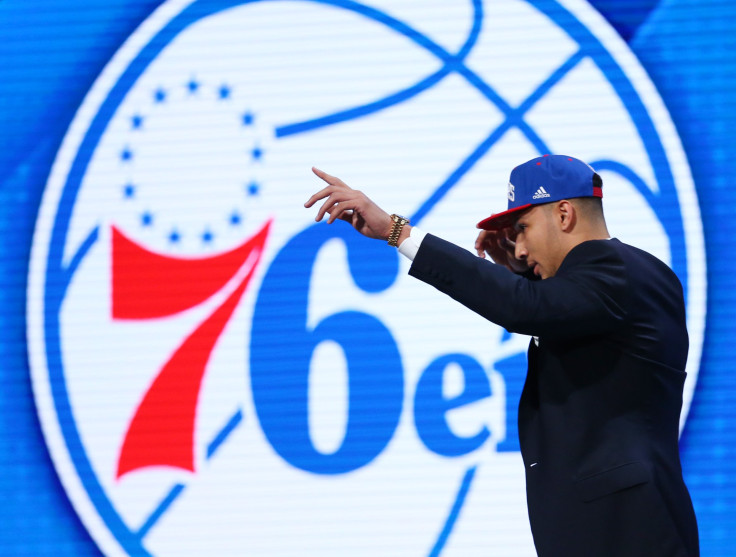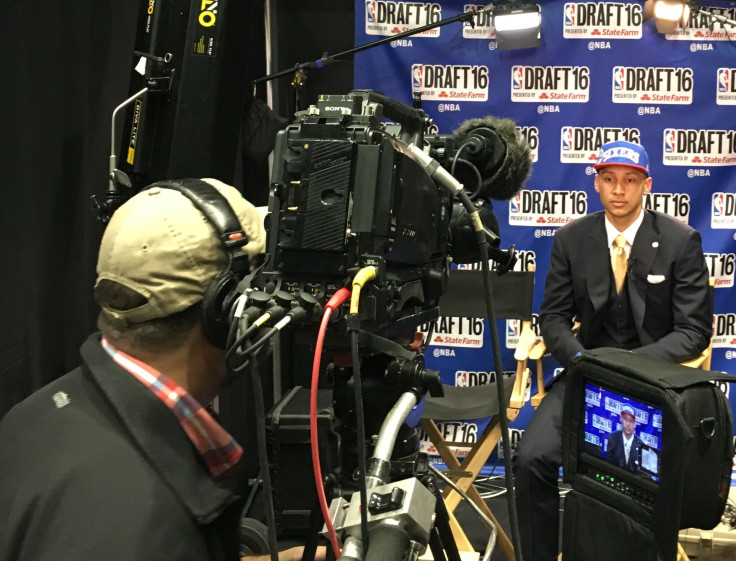NBA Draft 2016: For Rookie Players, Endorsement Deal Game Begins Long Before The Regular Season

No. 1 overall pick Ben Simmons was the most wanted man in Brooklyn Thursday night at the 2016 NBA draft. Before the picks rolled in, photographers elbowed their way through the crowd at the Barclays Center, jostling for position to snap a picture of the 6-foot-10 Australian. A small chorus of fans representing the Philadelphia 76ers — the team that would draft him — screamed from the stands, “We want you, Ben!”
After his official selection, Simmons was whisked off to an interview room. "It feels amazing, honestly. I can't even – my legs were shaking when I was on stage," he said.
His wobbly legs then shuffled along to a social-media video room, then to another press room, a buzzing warehouse of sorts lined with 14 separate interview booths that pushed out live television feeds across the globe from Philadelphia to Beijing.
Everybody wanted a piece of Simmons. But long before everyone swarmed him on draft night, and way before his first steps on an NBA court, major corporations had already been pursuing Simmons. And he was more than happy to hear them out.
For would-be NBA stars, shilling for companies well before their first game on a pro basketball court is now part of the process of becoming more than "just" a pro basketball player. Ahead of the draft Thursday night, Simmons had already appeared in a Foot Locker ad, was the subject of a planned Showtime documentary and had signed with Nike for an endorsement deal. In the Twitter and Instagram era, that's what it takes to become a household brand, a goal for a growing number of athletes who increasingly want to make a business out of playing ball.
"It does seem to happen earlier and earlier; you're seeing guys in commercials as soon as they graduate," said Bob Dorfman, sports marketing expert at Baker Street Advertising in San Francisco. "They're taking the opportunities where they can, and they also realize they can make more money with a shoe deal than they can with a salary."

Ever since Michael Jordan, basketball player, transformed into Michael Jordan, cultural icon, NBA stars have looked to build lucrative identities off the court. Consider NBA Finals MVP LeBron James — he's set to star in "Space Jam 2," signed a lifetime Nike deal for as much as $1 billion, launched an entertainment company, and created Uninterupted, a multimedia platform for athlete-focused content. Forbes estimated James makes $54 million in annual earnings off the court, dwarfing his $23 million salary from the Cleveland Cavaliers.
For the next crop of stars, the road to such riches had its first major landmark moment Thursday night in the Brooklyn Nets' arena.
Draftees look to copy the branding blueprint of veterans and typically start the process the second they're finished with college and free from the NCAA's prohibitive rules. It's the same in football. The No. 1 pick in April's NFL Draft, Jared Goff, for instance, found a way to discuss in a single pre-draft interview his five "pet" brands: razor company Gillette, shampoo brand Pantene, Giorgio Armani suits, Red Bull drinks and Bose headphones.
For his part, Simmons has already inked a Nike shoe deal, reportedly worth $7.5 million. Adidas, meanwhile, signed a bevy of talent from the draft, locking up top-10 picks Duke forward Brandon Ingram, California forward Jaylen Brown, Kentucky guard Jamal Murray, Croatian forward Dragan Bender and Providence guard Kris Dunn.
Shoe companies have long sought NBA rookies. What's changed recently is the aggressiveness with which players go after all kinds of endorsements. If you checked the social media feeds of top players before the draft, you would have found Ingram in a Draftkings video, Dunn pitching his draft-night look via J.C. Penney, and Murray posting about kicking off his summer with, of all things, Johnsonville sausages.
It used to be a whole process — "You do a photo shoot, you film a commercial … you put up a billboard," said Jonathan Jensen, a consultant and sports marketing professor at University of North Carolina, Chapel Hill, who spent a decade brokering athlete endorsement deals for brands. "Nowadays you do a deal with an athlete and have [social media ads] the next day. ... They can leverage these associations almost immediately."
It didn't stop during the draft, either. Ingram appeared in an NBA/JBL audio ad on Snapchat. Nike tweeted out an ad for Simmons, which he dutifully retweeted. Dunn again shouted out J.C. Penney in his press conference.
"This suit is actually made by J.C. Penney," he said to a roomful of reporters. "It's a great suit. They did something special for me."
Probably to the retail chain's delight, that quote inspired a number of stories about J.C. Penney.
Shout out to JC Penny https://t.co/drKt38U6ce
— Breaking News GO (@BreakingNews_GO) June 24, 2016
Everybody loves Rihanna pic.twitter.com/22r5Yxv335
— Tim Marcin (@TimMarcin) June 24, 2016
For brands, a young player is a hot commodity and a relatively safe investment, Jensen said. Especially as they're starting fresh on draft night.
"Nobody's a bust" yet on draft night, Jensen said. "It's going to be months or even a year before you know if the guy is good or not."
© Copyright IBTimes 2025. All rights reserved.






















